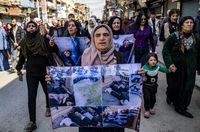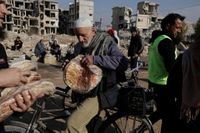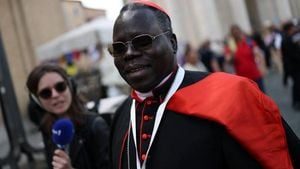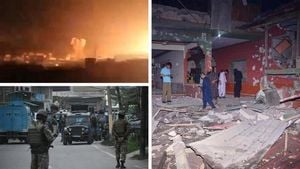Syria has found itself navigating a treacherous path in the years following the downfall of its longtime president, Bashar al-Assad. Once perceived as a moment of potential hope for change and stability, the rise of the interim president Ahmed al-Charaa has ushered in an era marked by escalating violence, particularly against the Alaouite community who have suffered horrific attacks in recent weeks.
Since the fall of Assad and the subsequent rise of Islamist groups such as Hayat Tahrir al-Sham (HTS) in late 2024, many Syrian Christians expressed a cautious optimism. However, that optimism quickly dissipated after the transition government announced on March 7, 2025, a call for volunteers to combat the "vestiges of the old government," which in practice led to systematic attacks against Alaouites.
Reports detail that in just three days, more than a thousand civilians—predominantly Alaouites—fell victim to these violent campaigns. This wave of aggression was accompanied by chants derogatory towards Alaouites, heightening the atmosphere of terror that enveloped the region.
"Many Christians feel threatened by jihadist groups. We knew them previously as Jabhat al-Nosra, responsible for attacks against Christians in the past," expressed Natalie, a 35-year-old Christian from Homs. Her sentiments reflect a shared apprehension across the spectrum of religious minorities in Syria.
In Idlib, for example, reports of forced displacement and assaults against Christians surfaced following al-Charaa's rise to power. "His fighters plundered Christian homes and warned all minorities that they must submit to sharia law or disappear," Natalie added, casting a shadow over claims made by al-Charaa about moderation and religious tolerance.
The reality on the ground starkly contradicts any narrative of moderation. Aliyah, a 44-year-old Alaouite, lamented the plight of her community: "Before this massacre, Alaouite employees were arbitrarily laid off. Now, we face the choice between starving or being killed due to our religious affiliation." The new constitution signed by al-Charaa on March 13 further deepens these fears, establishing that the head of state must be a Sunni Muslim with sharia as the governing source of law.
As incidents of intolerance continue to emerge—including attacks on Christians and forced separation in public spaces—communities are left in a state of despondency. Wakil reported a range of alarming occurrences: the destruction of crosses, the breaking of alcohol bottles, and the preaching of Islam in predominantly Christian neighborhoods. These actions have intensified fears among minorities who worry for their future in Syria.
Yet despite these grim realities, whispers of hope persist among some residents. Natalie, for one, maintains a fragile optimism. "I hope the influence of extremist groups diminishes and they receive no more foreign support," she stated, emphasizing the need for local communities to recognize the destruction brought by extremist ideologies.
The violence, however, shows no signs of abating. A recent incident in Homs saw four members of a family killed in their home by armed assailants, further evidencing the daily horrors faced by civilians. The Syrian Observatory for Human Rights reported that nearly 1,500 have died in targeted attacks against Alaouites over recent weeks, raising alarm over potential humanitarian crises.
Ongoing protests by displaced families are an echo of a community seeking refuge from the violence. Families are crossing into Lebanon; however, their futures remain uncertain, with many expressing a desire to find new lives far removed from the conflict. In the chaos, Asma, one of the displaced, noted, "We have lost hope in everything. Without a miracle, we cannot return. We are condemned to be displaced from one place to another."
The question for many is whether international involvement will emerge amid these humanitarian crises. Observers suggest that the international community, while alarmed by the ongoing massacres, has often been slow to respond effectively, weighed down by larger geopolitical interests.
"The regional powers are driven by the stability of Syria, often overlooking the dire plight of minorities," remarked Fabrice Balanche, an expert on Syrian politics, highlighting the complicated dynamics that govern international relations in the region.
In the face of such dire conditions, the community must grapple with fears of future violence, lingering under the specter of living as displaced persons or, worse, entering a realm of genocide as new data suggest a pre-genocidal environment emerging based on ongoing patterns of hate-based violence.
Researchers warn about both the ideological shifts and the failure of the state to protect its citizens—how authoritarian remnants can lead to cycles of revenge and violence that threaten to engulf entire communities.
As the world watches, the narratives of survival—like those shared by Natalie and Aliyah—provide critical insights into the lives affected by the devastating consequences of a power vacuum in Syria. The unfolding events serve as a stark reminder of the transformative impact of political changes and the urgent need for a dialogue centered on peace, security, and coexistence among Syria's diverse religious communities.
In conclusion, these crimes cannot be forgotten; the struggle for recognition and peace for the Alaouite and Christian communities in Syria continues amidst a backdrop of rising violence. Voices across these communities express the need for sustained attention and action from both Syrian leaders and the international community to stem the tide of violence before it’s too late.





